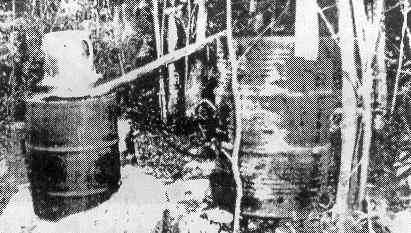
Hi Tribune Readers, hope all of you are enjoying this beautiful weather as much as I am. This week I will try to write a little about bootlegging in Benton County.
Moonshine, white lightning, or Devil's Brew, are some of the many names this home-brewed alcoholic beverage is called depending on who you are and what part of Benton County you live in. The making an selling moonshine was a major issue for the law enforcement people of Benton County for many years.
To some poor farmers with large families, it was a way to help feed the families, to the religious leaders in the community, it was "Devil's work" and they demanded that all the bootleggers be locked up.
There was always someone willing to risk getting caught either making moonshine or running (transporting) it. These people figured out ways to outfox the law and make a run without getting caught. It was very seldom one got caught in the act of cooking off whiskey. In most cases in which the law did make a raid, only the still was found and destroyed and the mash poured out.
Care had to be taken as to where to set up a still. A hollow with lots of woods around was a good place. In going and coming to the still, the moonshiners would never leave a beaten path and never let too much smoke rise to be spotted by the law.
The stills were usually made from empty barrels, and a car radiator was used for a distillation coil. The recipe for whiskey included corn, sugar, barrels or vats in which to place the mash (ground corn). When it was fermented, the mash was strained and the remaining liquid, "high in alcohol content," was heated in a covered vessel. this vessel had a pipe into which the steam was collected and passed through a cooling coil and condensed. This was corn whiskey (white lightning).

This writer knew a young man who ran whiskey. He would drive his car as far back to the still as he dared, then walk on to the still. The whiskey would be in glass jars or gallon jugs in town sacks packed with shucks. He would carry them to the car and site them in bushel baskets, then cover with more sacks. One night it came a rain and he crossed a small creek. His car drowned out. He also said he had driven many miles with no lights on.
In the early 1930s, Danville was an area of much bootlegging. The main place for them were the coal chute near the elevator at the railroad yards. As some of the trains would come into Danville, the conductors, engineers and others knew about this and were out for Danville's white lightning. The Harmons and Sulphur Creek areas had their share of stills too.
Around the early 1900s Camden business houses selling beer had agreed to stop allowing dancing and loudspeakers in their establishments. Seems the frolicking of the Saturday night drunks began to get on the nerves of the Board of Aldermen and they asked the business owners to hold down the noise.
In 1962 it was published that on Highway 70 on a Friday afternoon, two Highway Patrolmen, H.T. Swayne and Troy Odle, were on regular duty on the levee east of Camden. A car out of Davidson County came down Highway 70, and turned off on Old Ferry Road. For some reason the troopers pursued them and when they stopped the car they found 100 gallons of untaxed whiskey. These men had been stopped before by Camden Police who took 97 gallons of the same thing from them.
In 1964, the Sheriff Loye Furr and his deputies raided a moonshine still operation near Sulphur Creek Boat Dock and arrested two men. There were about 60 gallons there. Also found were bags of enriched cornmeal distributed by the U.S. Department of Agriculture in Washington, D.C. It was marked "Not to be sold or exchanged." This was the type of meal used in the school lunch program at that time.
Giving love is the most important thing we can do. God is love. When we act in love we are forming part of His circle that keeps us moving and as a circle it will return to us.
Server space for the TNGenWeb Project is provided through the generosity of US Internet.
The TNGenWeb Project makes no claims or estimates of the validity of the information submitted and reminds you that each new piece of information must be researched and proved, or disproved by the weight of evidence.
You are welcome to copy information found on the Benton County TNGenWeb site for personal use, and share information with other researchers or genealogical organizations, but this information may not be sold or used in a commercial project without expressed permission. All material submitted by individuals for inclusion in this site remains their property.